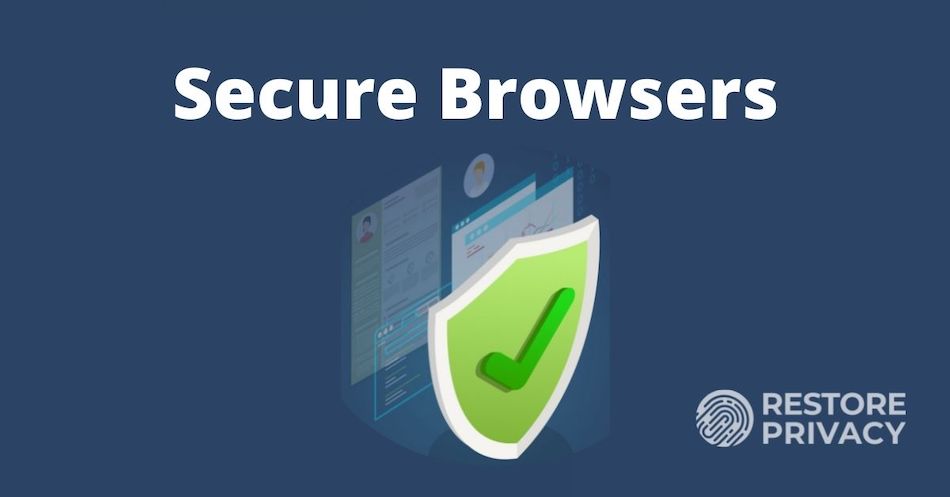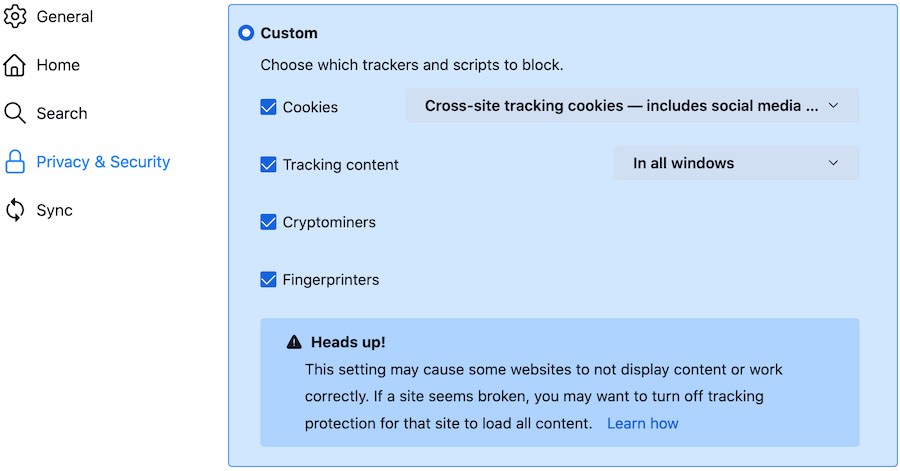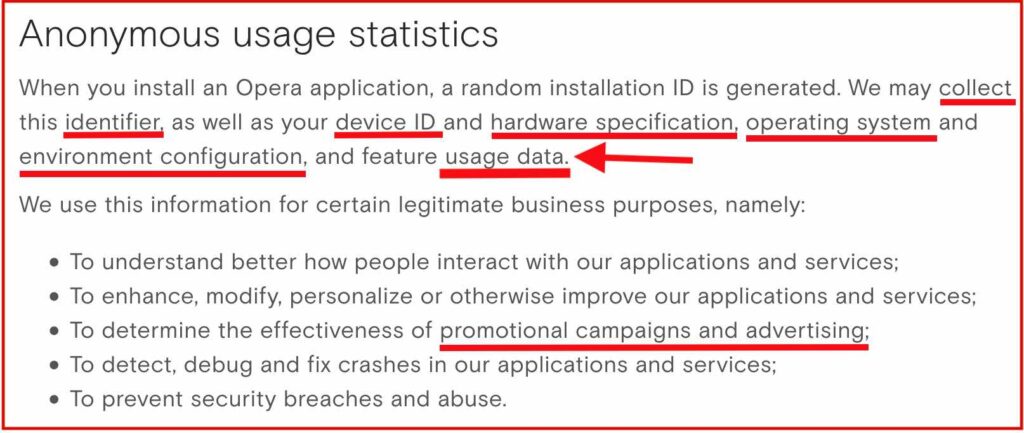To Help Protect Your Privacy Sign in Again

A secure browser that protects your privacy is a critical tool for staying safe online and keeping your information secure from third parties. We have been reviewing, testing, and ranking browsers for the past six years and this guide contains the latest recommendations for 2022.
Exercise you desire a secure browser that truly keeps your information individual? Well, you may be surprised by how much of your data is really getting exposed.
WARNING: Many browsers today are actually data drove tools for ad companies. This is the example for Google Chrome, the largest and most popular browser. Past collecting data through your browser, these companies can make money through their advertising partners with targeted ads. We meet this aforementioned privacy-abusing business concern model with search engines, email services, and fifty-fifty costless mobile apps.
Unless properly configured, well-nigh browsers incorporate lots of private information that can be exploited – or only collected – by various 3rd parties:
- Browsing history: all the websites you visit
- Login credentials: usernames and passwords
- Cookies and trackers: these are placed on your browser by the sites you visit
- Autofill information: names, addresses, phone numbers, etc.
And equally nosotros will explain farther below, using "private" or "incognito" browsing will non protect you lot. Your IP address will remain exposed and various third parties can still rails all of your activities. Just you lot don't fifty-fifty need to take my word for it. Here is a headline that illustrates the lengths companies will go to collect your browsing activities.

And even with a locked-down and hardened browser, there may still be exploits that reveal your information and potential identity. For case, Google Chrome announced a astringent zip-24-hour interval flaw that could allow hackers to remotely execute code on affected systems. We discuss another privacy issues (and solutions) in our guides on browser fingerprinting and also WebRTC leaks.
Merely don't allow this stress you out. There are constructive solutions and tools that we will cover in detail beneath. In this browser security and privacy guide, nosotros're going to explicate the post-obit topics:
- Best secure browsers that respect your privacy
- Bug with other browsers
- Browser privacy compartmentalization
- Secure browser add-ons
- "Private browsing" style is NOT very private (and why you lot demand a VPN)
Incognito / Individual browsing mode leaves yous exposed
When using "private" or "incognito" browsing mode in your browser, your existent IP address and location are still being revealed to every website, ad, and tracker that loads in your browser. Additionally, all your activities remain visible to your internet access provider (ISP). And as we have recently learned, ISPs log everything you lot do online and share the data with many other parties. This is why it's disquisitional to use a good VPN for basic digital privacy.
The best way to achieve truthful privacy while hiding your real IP address and online activities is to employ a secure browser together with a skillful VPN. This will hide your real IP address and location, while also encrypting and anonymizing your traffic and so your Internet access provider cannot see your activities online. Here are our top three recommendations from the all-time VPN list that nosotros have tested and reviewed:
- NordVPN: A fast, secure, audited VPN with advanced privacy features and a strict no-logs policy, based in Panama (with a 68% off coupon).
- Surfshark VPN: A no-logs VPN service with a large lineup of privacy and security features, based in The netherlands.
- ExpressVPN – This is a secure and reliable VPN that boasts some cracking privacy features and also works well for streaming. Information technology is based in the British Virgin Islands.
Now let's examine the most secure browsers that you can combine with a VPN for maximum privacy.
Secure browsers that protect your privacy
In this section nosotros will examine the best browsers based on two chief factors:
- Security: How well does the browser protect you from hackers, vulnerabilities, and online exploits?
- Privacy: How much data is the browser itself collecting about yous and who is this data beingness shared with? How does the browser protect your privacy?
Alien opinions! Just similar with Tor, opinions almost browser privacy and security tin can exist wildly divergent and contentious.
This guide is not meant to sell everyone on ane browser that beats all others. Rather, it is a summary of information about different spider web browsers that exercise well with both privacy and security. Cull the best browser for you lot based on your own unique needs and threat model.
Here are the nearly secure and private browsers for 2021:
1. Brave: The most secure and private browser (by default)

Brave is arguably the nigh secure browser with simple, out-of-the-box privacy. It is a Chromium-based browser that is fast, secure, and privacy-focused by default. It has a congenital-in ad blocker and browser fingerprinting protection, while also giving y'all access to numerous add-ons and extensions. The master programmer behind Brave is Brandon Eich, who formerly worked for Mozilla.
To summarize this browser, Brave is based on open up-source Chromium, simply configured for more privacy. It does well with its default privacy settings and extra features. Here is a brief overview:
- Blocks ads and trackers past default
- Protects against browser fingerprinting and even offers fingerprint randomization
- Congenital-in script blocker
- Blocks all 3rd-party storage
- Automatically upgrades to HTTPS (HTTPS Everywhere)
- Easy access to the Tor network
One of the reasons nosotros like Brave is because information technology offers uncomplicated, out-of-the-box privacy by default. This makes information technology platonic for those who practise non have the time, patience, or know-how for browser customizations and tinkering. Brave can also be used with Chrome extensions, making information technology an ideal alternative for Chrome. Just download it and yous're good to go.
Tor network – Brave too has a characteristic that allows yous to access the Nighttime web by but opening a new window with Tor. Nosotros discuss this feature in our guide on how to access the Dark spider web safely.
Ads – Dauntless has received some criticism for its ads programme, which allows users to "view non-invasive ads without compromising your privacy." While some people detect information technology hypocritical that a privacy-focused browser has its ain ad program, we also encounter it as a secure source of funding. And with many browsers financially struggling, it appears that Brave'due south concern model is securing this browser'due south future and ability to go along to innovate its products.
Equally one case of these innovations, Brave is currently developing a individual search engine called Brave Search. Additionally, Brave continues to meliorate and innovate with its browser, which is growing in popularity.
You tin read more near Brave'due south privacy features hither.
https://brave.com
ii. Firefox (modified and tweaked for privacy)

Firefox is a cracking accommodating browser for privacy and security. It offers stiff privacy protection features, many customization options, excellent security, and regular updates with an active development team. The newest version of Firefox is fast and lightweight with many privacy customization options.
Out of the box, Firefox is not the best for privacy, but it can be customized and hardened, and we show you exactly how in our Firefox privacy modifications guide. Be sure to disable telemetry in Firefox, which is a feature that will collect "technical and interaction data" and also "install and run studies" within your browser.
Within the Privacy & Security settings area, there are many useful customization options for different levels of privacy: Standard, Strict, or Custom.

Another smashing benefit with Firefox is the ability to use numerous browser extensions that can raise your privacy and security. We'll go over some of these extensions further beneath.
Firefox highlights:
- Open source code that has been independently audited
- Agile development with frequent updates
- Fantabulous privacy features and customization options
- Many browser extensions supported
- Telemetry and tracking needs to exist manually disabled
- Other modifications necessary for extra privacy and security
If you want to keep using older add-ons that are no longer supported past the latest Firefox release, you lot can go with the Firefox Extended Support Release (ESR). If you want a privacy-focused version of Firefox for Android, you lot could try Firefox focus.
For boosted customization and privacy settings, check out ourFirefox privacy guide.
https://www.mozilla.org/firefox
3. Tor browser

Adjacent upward we accept the Tor browser. The Tor browser is a hardened version of Firefox that is configured to run on the Tor network. By default, the Tor Browser is a secure browser that protects you against browser fingerprinting, but information technology also has some disadvantages.
Because it uses the Tor network, which routes traffic over 3 unlike hops, download speeds with the Tor browser can be quite slow. The default version may also break some sites due to script blocking. Finally, there are as well drawbacks with the Tor network itself, including malicious/dangerous exit nodes, high latency, dependence on US authorities financing, and some consider it to be fundamentally compromised. There are also many websites that cake IP addresses originating from the Tor network. (See the pros and cons of Tor here.)
Another option is to employ the Tor browser with the Tor network disabled. In this sense, the Tor browser will work like the other browsers we've covered to a higher place. Additionally, you can simply run a VPN in the background. Like the Tor network, a VPN will also encrypt your traffic and hide your IP, but it volition be much faster.
Exist careful when adjusting the settings for the Tor browser, all the same, as this may compromise the browser'due south built-in privacy and security features.
https://world wide web.torproject.org/
iv. Ungoogled Chromium browser

Ungoogled Chromium is an open source project to provide a Chromium browser, without the Google privacy problems:
ungoogled-chromium is Google Chromium, sans dependency on Google spider web services. It also features some tweaks to enhance privacy, control, and transparency (almost all of which require manual activation or enabling).
ungoogled-chromium retains the default Chromium experience as closely as possible. Unlike other Chromium forks that take their own visions of a web browser, ungoogled-chromium is essentially a drop-in replacement for Chromium.
Ungoogled Chromium receives regular Chromium security updates.
https://github.com/Eloston/ungoogled-chromium
5. Bromite (Android)

Bromite is a Chromium-based browser for Android only (no desktop support). Information technology comes with some great features by default, including ad blocking and various privacy enhancements. Hither are some highlights of this browser from the official Bromite website:
- The main goal is to provide a no-ataxia browsing experience without privacy-invasive features and with the addition of a fast advertisement-blocking engine.
- Minimal UI changes are practical to help curbing the idea of "browser every bit an advertisement platform".
- All patches are published under GNU/GPL v3 to enable other open source projects' usage.
- Bromite is just available for Android Lollipop (v5.0, API level 21) and above.
Another cool feature I like with Bromite is that you can use custom ad block filters — learn more here. Bromite is nether active development and remains a great browser for Android users.
https://www.bromite.org/
6. DuckDuckGo privacy browser (iOS and Android)

The DuckDuckGo privacy browser is a new add-on to our lineup. This browser is available for mobile devices on iOS and Android and comes with lots of privacy-focused features by default. According to this blog mail, DuckDuckGo'due south browser offers:
- Congenital-in tracking protection
- Encryption upgrades via Smarter Encryption engineering science
- Easy information management and immigration options
- Fast speeds
This browser is at present available on both the Google Play and Apple tree stores.
Private browsers worth mentioning
Below are a few private and secure browsers that are worth mentioning. However, these browsers did non quite make the cut to be recommended, for various reasons listed below.
vii. Waterfox
Waterfox is a fork of Firefox that was maintained by just one person for many years. In February 2020, news blew up on reddit that it had sold out to a pay-per-click advertisement company called System1. The news was likewise picked up by others, which resulted in Waterfox and System1 formally announcing the conquering (only only after the news bankrupt).
The problem here is the apparent contradiction of an ad company (that relies on data collection) owning a privacy-focused browser. Equally I previously reported, System1 also acquired a stake in Startpage, the private search engine based in The netherlands. In researching the company's groundwork, information technology appears that System1 is fundamentally in the business of data collection:
"In our business," Blend adds, "if nosotros can get together as much data as possible, give information technology off to our engineers and data scientists, and then manage the two effectively, the business organisation can quickly scale."
So can Waterfox still be trusted at present that it'due south owned by an advertising-tech visitor? Yous tin can be the estimate.
viii. Pale Moon
Stake Moon is another open-source fork of Firefox, which aims forefficiency andcustomization. In testing out Pale Moon, it does offer different customization options, every bit well as support for older Firefox add-ons and its own lineup of add-ons. The design feels a bit dated, but it's also not overly-chaotic and is lightweight and fast.
Pale Moon is currently available on Windows and Linux, with other operating systems in development. Unlike other Firefox forks, Pale Moon runs on its own browser engine, Goanna, which is a fork of Gecko (used by Firefox). This is an older engine that was previously used by Firefox, but has long since been replaced. Many argue that this older codebase is a security vulnerability. And it's besides worth noting that the development team is very pocket-size compared to more pop browsers.
ix. GNU IceCat
GNU IceCat is a fork of Firefox from the GNU free software project. IceCat is entirely "free software" every bit defined here and as well includes diverse privacy add-ons and tweaks past default. Here are the privacy-protection features listed from the IceCat page:
- LibreJS
- HTTPS-Everywhere
- SpyBlock
- AboutIceCat
- Fingerprinting countermeasures
Slow updates – The big issue with GNU IceCat is that updates are very tedious, and in some cases, years behind. This can expose IceCat users to security vulnerabilities, which is why we are no longer recommending information technology.
10. Iridium
Like Dauntless, Iridium is a secure browser that is based on Chromium and configured for more privacy by default. The following excerpt from Iridium's website provides a expert overview of this secure browser:
Iridium Browser is based on the Chromium lawmaking base. All modifications enhance the privacy of the user and brand sure that the latest and all-time secure technologies are used. Automatic transmission of partial queries, keywords and metrics to central services is prevented and only occurs with the blessing of the user. In addition, all our builds are reproducible and modifications are auditable, setting the project ahead of other secure browser providers.
Unfortunately, like IceCat above, updates to Iridium are few and far betwixt.
Issues with other popular browsers
While some browsers claim to be secure against vulnerabilities, they might not exist the best choice from a privacy perspective.
one. Google Chrome
Google Chrome is by far the most popular browser. Unfortunately, it'south a data collection tool as well and not a practiced choice for anyone looking for privacy.
Y'all can safely presume that everything you practise through Google Chrome is collected, saved to your data profile, and used for targeted advertising.
2. Microsoft Internet Explorer/Edge
Border is a Microsoft product.
But like with Windows, it's a good idea to avoid Microsoft products, including Internet Explorer, and their newer browser called Edge. Internet Explorer and Edge are also closed-source, then there's no telling what'southward going on behind the scenes, and they're also not the best for privacy reasons.
iii. Opera browser
Opera started off as a decent browser, adult in Norway. Even so, in 2022 it was sold to a Chinese consortium for $600 million – and a lot has changed. Opera'due south privacy policy explains how your information is beingness collected and shared when you lot employ Opera products. Here's what I found:

Opera also claims to offer a free VPN through the browser. Withal, equally we covered in the Opera VPN review, information technology'due south not actually a VPN and does not offer full system-wide encryption. Additionally, your data is being nerveless when y'all use Opera browser and its "complimentary VPN" feature.
4. Epic browser
Ballsy is a browser based on Chromium, created past "Subconscious Reflex" which is based in India. Since 2014, Epic has been claiming they would open up source the code, merely it remains closed source today. What'due south going on behind the scenes? How do they manage Chromium and remove invasive code? Who knows.
Only like with Opera VPN, Ballsy falsely claims to offer a "complimentary VPN" through the browser, simply this is not really true. The browser is merely routing traffic through a US proxy server. Every bit we learned with Opera (and with many other "free proxy" services), proxies are often used for data collection (and they are ofttimes not secure). When reading the Epic privacy policy, we find that data from "video download and proxy services" is being collected.
One person who analyzed Epic found information technology to be connecting to Google on startup. This suggests that Ballsy is non, in fact, de-googled as it claims.
There are many improve Chromium-based browsers to consider.
5. Safari browser
Safari is the default browser for Mac Bone and iOS devices. Overall, Safari is non a horrible choice in terms of privacy and tracking protection – but it too cannot exist recommended for a few reasons:
- Apple is a partner in the PRISM surveillance programme
- Apple was caught "hoarding" Safari browsing history – fifty-fifty after it was deleted
- Apple was found to be collecting Safari history fifty-fifty when used in private mode
On a positive note, however, Apple does somewhat meliorate with privacy than other big companies. The Safari browser blocks third-party cookies by default and also implements cross-site tracking protection.
6. Vivaldi browser
Vivaldi is a Chromium-based browser with source-lawmaking modifications that tin be seen here. It is less popular than other browsers, with less active development than Firefox, for example.
Reading through their Privacy Policy, I did detect some apropos data about information collection and the utilize of unique IDs:
When yous install Vivaldi browser ("Vivaldi"), each installation profile is assigned a unique user ID that is stored on your computer. Vivaldi will ship a message using HTTPS straight to our servers located in Republic of iceland every 24 hours containing this ID, version, cpu architecture, screen resolution and time since last message. We anonymize the IP address of Vivaldi users by removing the terminal octet of the IP address from your Vivaldi client then we shop the resolved approximate location after using a local geoip lookup. The purpose of this drove is to determine the total number of agile users and their geographical distribution.
You can read more than about Vivaldi hither, although it's not recommended for privacy reasons.
Secure and private browsers on mobile devices
Many of the recommended browsers above also offer versions for mobile users on iOS and Android.
With that existence said, here some good options for mobile users:
- Dauntless
- Bromite
- Firefox Focus
- DuckDuckGo
I also like using standard Firefox on mobile devices with customization and configurations for more privacy.
Browser privacy and compartmentalization
One problem that often comes with browser privacy and security is that people desire to remain logged in to various accounts, while also browsing the web. Just this is problematic. When you lot stay logged in to Gmail or Facebook, for example, their trackers can record your activeness as you scan the web.
I potential solution to this trouble is browser compartmentalization. This is when y'all use unlike web browsers for dissimilar online activities. For instance:
- Browser #i volition only be used for accessing your online accounts that require a countersign. You can stay logged in with only this browser, and information technology won't exist used for general browsing.
- Browser #2 volition only be used for web browsing, with diverse privacy configurations and no cookies or history beingness stored on the browser.
- Browser #3 could be completely locked down for maximum privacy and security.
You tin can also utilize dissimilar browsers, configured exactly the way you want, for various purposes, depending on your needs and threat model. The key is to go on the compartmentalization strict and non intermission the rules/uses for each browser.
Virtual machines – On the topic of compartmentalization, using virtual machines is likewise a good idea for both privacy and security. You can easily run Linux VMs through VirtualBox (FOSS) on your host computer.
Password managers – It should besides be noted that storing your passwords in the browser may be risky depending on the browser yous are using, especially since browsers may store passwords in cleartext. A better alternative would be to utilize a secure password manager. Nosotros have reviewed many popular options, including Bitwarden, Dashlane, LastPass, and more.
Browser add-ons for security and privacy
In addition to adjusting the settings inside your browser, there are also a number of different add-ons or extensions you can install to improve your browser's privacy and security.
Here are a few different options, but they may not all be supported past the browser y'all are using:
- uBlock Origin – This is 1 of the best browser-based advertizement blockers bachelor that volition as well protect you lot confronting tracking.
- HTTPS Everywhere – An add-on from the folks at Electronic Frontier Foundation, this will strength websites to use a secure HTTPS encrypted connection (when bachelor).
- Cookie Autodelete – This volition automatically delete cookies that are no longer needed from your browser.
- NoScript – NoScript allows you to customize exactly which scripts run on the websites you lot visit. Like uMatrix, this is for avant-garde users and requires lots of customization.
Warning: Exist cautious almost using third-party add-ons and browser extensions. Practice your enquiry first, since add-ons could function every bit spyware and information collection tools for third parties. This is especially true with free VPN services or browser proxy add-ons, even if they are highly rated in the Google Play or Apple stores.
"Private" or "Incognito" browsing mode is Not private (and why yous demand a VPN)
Many people falsely presume that using "individual" or "incognito" mode in a browser actually provides some privacy. This is a fake assumption.
Using "private" browsing mode merely stops your browser from storing cookies, history, and passwords. Just information technology doesn't actually brand you any more than "private" to the outside world. Even when browsing in "private" or "incognito" way, you are still exposed:
- Your cyberspace provider tin can notwithstanding see every site you visit. And note that internet providers are now forced to log web browsing activity of their customers and provide this data to authorities on request in many countries. In the United states of america, ISPs log everything and share the data with a huge network of 3rd parties.
- Your real IP address and location remain exposed to all sites, ads, and trackers. This makes tracking and identification like shooting fish in a barrel since your device has a unique IP address linked back to your identity through your net service provider.
To easily solve these problems, we strongly recommend using a good VPN service. Using a VPN is unproblematic. You just need to sign up for a VPN subscription, download the VPN app for your device, and then connect to a VPN server and scan the web as normal. This offers many benefits:
- A VPN volition securely encrypt your internet traffic, which prevents your Internet access provider from seeing what you lot do online. (Your ISP will just meet encrypted information, but not what you're actually up to.)
- When you connect to a VPN server, the VPN server'south IP address and location will replace your real IP address and location. This allows you to appear to exist anywhere in the world.
- A VPN will besides allow you to access geo-restricted content, such every bit streaming Netflix with a VPN from anywhere in the earth.

Below is a brief overview of our recommended VPNs that have come out on summit in testing for the respective VPN reviews.
- NordVPN: A fast, secure, audited VPN with avant-garde privacy features and a strict no-logs policy, based in Panama (with a 68% discount coupon). Run across our NordVPN review here.
- Surfshark VPN: A no-logs VPN service with a large lineup of privacy and security features, based in Holland. See the Surfshark VPN review.
- ExpressVPN – A fast, reliable, and secure VPN that also works well for streaming, merely with above-boilerplate prices. See the ExpressVPN review for the pros and cons.
Curt on coin? There are too some expert cheap VPNs that offer excellent features and performance, without breaking the bank.
Conclusion on secure browsers and privacy
A well-configured secure browser is crucial for protecting your data as you browse the spider web with privacy.
Finding the best secure browser all comes down to identifying the all-time fit for your unique needs. Since this is a personal decision with subjective criteria, I tend to avoid recommending simply one choice for all utilize cases.
In addition to using a secure browser that is configured to protect your privacy, you should too consider using a good advert blocker. Ads function as tracking to collect your browsing data and serve you targeted ads. If you aren't blocking ads, your activities tin can exist tracked past third-party advertisement networks, with any site hosting ads.
In terms of privacy, yous may besides want to protect yourself against browser or device fingerprinting and WebRTC browser leaks, which tin can expose your identity fifty-fifty when using a good VPN service.
Other roundup guides on RestorePrivacy:
- Secure Email Services
- Private Search Engines
- Password Managers
- Advertizement Blockers
- Best VPN Services
- Best Cloud Storage
- Best Secure Messaging Services
This secure browser guide was concluding updated on Dec 28, 2021.
Source: https://restoreprivacy.com/browser/secure/
0 Response to "To Help Protect Your Privacy Sign in Again"
Post a Comment